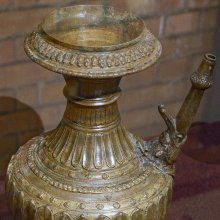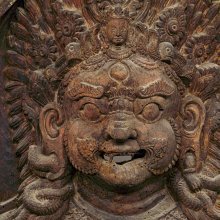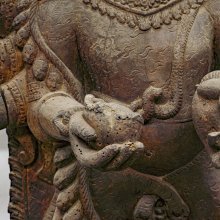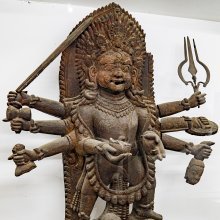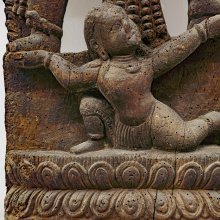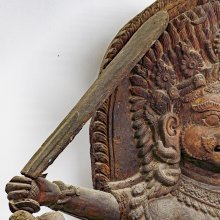Dhala, Ḍhaḷa, Ḍhala: 12 definitions
Introduction:
Dhala means something in Hinduism, Sanskrit, Marathi, Hindi, biology. If you want to know the exact meaning, history, etymology or English translation of this term then check out the descriptions on this page. Add your comment or reference to a book if you want to contribute to this summary article.
The Sanskrit term Ḍhaḷa can be transliterated into English as Dhala or Dhalia, using the IAST transliteration scheme (?).
Alternative spellings of this word include Dhaal.
Images (photo gallery)
(+1 more images available)
Biology (plants and animals)
Source: Google Books: CRC World Dictionary (Regional names)1) Dhala in India is the name of a plant defined with Plumeria rubra in various botanical sources. This page contains potential references in Ayurveda, modern medicine, and other folk traditions or local practices It has the synonym Plumeria incarnata Mill. (among others).
2) Dhala is also identified with Themeda arundinacea It has the synonym Andropogon arundinaceus (Roxb.) Voigt, nom. illeg., non Andropogon arundinaceus Bergius (etc.).
Example references for further research on medicinal uses or toxicity (see latin names for full list):
· Journal of Ethnobiology and Ethnomedicine. (2006)
· Flora Indica; or descriptions … (1820)
· Flora Peruviana (1799)
· Flore Générale de l’Indo-Chine (1922)
· Journal of Cytology and Genetics (1990)
· Synopsis Plantarum Glumacearum (1854)
If you are looking for specific details regarding Dhala, for example extract dosage, health benefits, side effects, chemical composition, pregnancy safety, diet and recipes, have a look at these references.

This sections includes definitions from the five kingdoms of living things: Animals, Plants, Fungi, Protists and Monera. It will include both the official binomial nomenclature (scientific names usually in Latin) as well as regional spellings and variants.
Languages of India and abroad
Marathi-English dictionary
Source: DDSA: The Molesworth Marathi and English Dictionaryḍhaḷa (ढळ).—m (ḍhaḷaṇēṃ) Slidden state, state of a body slidden, or slipped aside or out. 2 Failure, slip, lapse, omission of performance or obervance.
--- OR ---
ḍhāla (ढाल).—f (S through H) A shield. 2 The grand flag of an army directing its march and encampments: also the standard or banner of a chieftain: also a flag flying on forts &c. v dē. 3 Among women. Adam's apple. 4 n Applied to any bold, forward, masculine deed of women. v giḷa. ḍhāla dēṇēṃ (To pitch the grand flag.) To stand forth as equipped or prepared (to flight,dispute argue &c.); to declare a challenge or a defiance: also to exhibit ppurpose or readiness for a journey &c. And ulaṭī ḍhāla dēṇēṃ To turn against rebelliously. Also ḍhāla ulaṭaṇēṃ-phiraviṇēṃ in this sense.
--- OR ---
ḍhāla (ढाल).—a or ḍhālagaja a (ḍhāla and gaja. Bold as a war-elephant with his head proctected by a shield.) Used reproachfully of an audacious, immodest, masculine woman and of the headstrong, daring , impetuous, or open, public and unfeminine deeds or course of such: also of any desperate, outrageous, half-frantic woman or woman's deed. Applied also by women to wild, adventurous children, and to their tricks and pranks. 2 Applied also to any monstrously large and gross woman. 3 Seditious, turbulent, violent, law-braving--a person gen.
--- OR ---
ḍhāḷa (ढाळ).—m A motion or stool, an alvine discharge; esp. as occasioned by purgative medicines or by disease. 2 A purgative. 3 Slope, inclination of a plane. 4 Lustre (of pearls). Pr. mōtyālā ḍhāḷa kitī asatō. 5 Cast, mould, form (as ofmetal vessels, trinkets &c.) 6. m Way, manner, style. v paḍa. ḍhāḷa dēṇēṃ To dismiss or turn off (a servant &c.) 2 To shuffle off, evade, elude. ḍhāḷākhālīṃ or ḍhāḷīṃ paḍaṇēṃ g.of o. also ḍhāḷa paḍaṇēṃ or lāgaṇēṃ in.con. To fall into the manner or style of. ḍhāḷākhālīṃ cālaṇēṃ To proceed in or after the ordinary fashion.
--- OR ---
ḍhāḷā (ढाळा).—m A small leafy branch, spring. 2 A plant of gram, sometimes of vāṭāṇā, or of lāṅka.
--- OR ---
dhālā (धाला).—p p of dhāṇēṃ q. v. dhālāmālā by redup. Satisfied or sated (esp. with food): also easily satisfied.
Source: DDSA: The Aryabhusan school dictionary, Marathi-Englishḍhaḷa (ढळ).—m Slidden state. Failure, slip.
--- OR ---
ḍhāla (ढाल).—f A shield. A flag flying on forts, &c. Adam's apple. Bold deed of women. ḍhāla dēṇēṃ To stand equipped to fight; to declare a challenge. ulaṭī ḍhāla dēṇēṃ To turn against rebelliously.
--- OR ---
ḍhāla (ढाल).—a ḍhālagaja a Used of an immodest, masculine, gross woman. Turbulent.
--- OR ---
ḍhāḷa (ढाळ).—m A stool. A purgative. Cast. Slope. Lustre. Way.
--- OR ---
ḍhāḷā (ढाळा).—m A sprig. ḍhāḷī f A branch.
--- OR ---
dhālā (धाला).—p p of dhāṇēṃ Satisfied or sated (esp. with food).
Marathi is an Indo-European language having over 70 million native speakers people in (predominantly) Maharashtra India. Marathi, like many other Indo-Aryan languages, evolved from early forms of Prakrit, which itself is a subset of Sanskrit, one of the most ancient languages of the world.
Sanskrit dictionary
Source: DDSA: The practical Sanskrit-English dictionaryḌhāla (ढाल).—A shield.
Derivable forms: ḍhālam (ढालम्).
Source: Cologne Digital Sanskrit Dictionaries: Shabda-Sagara Sanskrit-English DictionaryḌhāla (ढाल).—n.
(-laṃ) A shield.
Source: Cologne Digital Sanskrit Dictionaries: Cappeller Sanskrit-English DictionaryḌhāla (ढाल).—[neuter] shield.
Source: Cologne Digital Sanskrit Dictionaries: Monier-Williams Sanskrit-English DictionaryḌhāla (ढाल):—n. ‘a shield’ See lin.
Source: Cologne Digital Sanskrit Dictionaries: Yates Sanskrit-English DictionaryḌhāla (ढाल):—(laṃ) 1. n. A shield.
[Sanskrit to German]
Sanskrit, also spelled संस्कृतम् (saṃskṛtam), is an ancient language of India commonly seen as the grandmother of the Indo-European language family (even English!). Closely allied with Prakrit and Pali, Sanskrit is more exhaustive in both grammar and terms and has the most extensive collection of literature in the world, greatly surpassing its sister-languages Greek and Latin.
Hindi dictionary
Source: DDSA: A practical Hindi-English dictionaryḌhāla (ढाल) [Also spelled dhaal]:—(nf) a shield; slope, declivity, falling gradient; pitch, ramp; —[banānā] to act as a defence/safeguard.
...
Kannada-English dictionary
Source: Alar: Kannada-English corpusḌhāla (ಢಾಲ):—[noun] = ಢಾಲು [dhalu]2 - 1.
--- OR ---
Ḍhāḷa (ಢಾಳ):—[noun] = ಢವಳ [dhavala].
--- OR ---
Ḍhāḷa (ಢಾಳ):—[adjective] of white colour; white.
--- OR ---
Ḍhāḷa (ಢಾಳ):—
1) [noun] the large, spiral, univalve shell of any of certain marine molluscs used as a trumpet; a conch.
2) [noun] the white colour.
--- OR ---
Ḍhāḷa (ಢಾಳ):—[noun] a small cube of plastic, ivory, bone or wood, marked on each side with one to six spots, usu. used in pairs in games of chance or in gambling; a die.
--- OR ---
Dhāḷa (ಧಾಳ):—
1) [noun] a broad piece of armor, carried as a defence against swords, lances, arrows, etc.; a shield.
2) [noun] a shield-like metal plate, usu. of silver, awarded in a sports contest or other competition; a trophy.
Kannada is a Dravidian language (as opposed to the Indo-European language family) mainly spoken in the southwestern region of India.
See also (Relevant definitions)
Starts with (+363): Dhala baigaba, Dhala kaincha, Dhala sundari, Dhala-katira-nai, Dhala-kheti, Dhala-nikasa, Dhala-tulasi, Dhala-vali, Dhalaa jhota, Dhalabani, Dhaladara, Dhaladhakata, Dhaladhala, Dhaladhalane, Dhaladhalanem, Dhaladhali, Dhaladhalita, Dhaladhuli, Dhalai, Dhalaisu.
Ends with (+71): Adhala, Adhalamadhala, Ajamdamamdhala, Ambyaca Dhala, Ambyaca-dhala, Amsudhala, Andhala, Ardhala, Ashaddhala, Ashadhdhala, Ashudhala, Bodhala, Brihaddhala, Budhala, Cadhala, Caladhala, Candhala, Caudhala, Cavadhala, Cendhalamendhala.
Full-text (+60): Dhaal, Pancahatyari, Dhala baigaba, Dhala kaincha, Dhala-tulasi, Dhala sundari, Dhal, Balaprada, Dhala-kheti, Dhalaka, Gamvadhala, Sukhadhala, Dhalin, Dhala-vali, Camara, Sadhuvandana, Brihaddhala, Ambyaca-dhala, Dhaladhakata, Ulatadhala.
Relevant text
Search found 4 books and stories containing Dhala, Ḍhaḷa, Ḍhala, Ḍhāla, Ḍhāḷa, Ḍhāḷā, Ḍhālā, Dhālā, Dhāḷa; (plurals include: Dhalas, Ḍhaḷas, Ḍhalas, Ḍhālas, Ḍhāḷas, Ḍhāḷās, Ḍhālās, Dhālās, Dhāḷas). You can also click to the full overview containing English textual excerpts. Below are direct links for the most relevant articles:
Brihat Samhita (by N. Chidambaram Iyer)
Chaitanya Bhagavata (by Bhumipati Dāsa)
Verse 3.5.542 < [Chapter 5 - The Pastimes of Nityānanda]
Verse 3.5.560 < [Chapter 5 - The Pastimes of Nityānanda]
Folk Tradition of Bengal (and Rabindranath Tagore) (by Joydeep Mukherjee)
Expansion of the Gupta Empire < [July-August, 1929]
